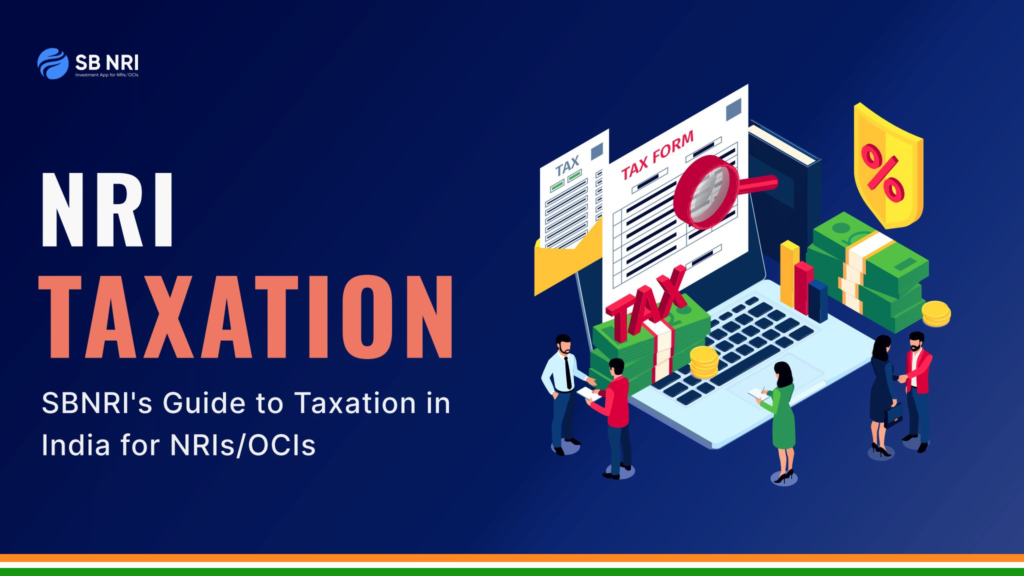
If you are planning to sell a property in India, you must be aware of tax implications on the gain arising from the sale of such assets. Tax liability on these assets depends on the duration for which the property was held by the seller and is calculated under the head ‘Capital Gains’. Capital gains are classified into two categories – long-term capital gains and short-term capital gains. For example, you will have to pay long term capital gain tax on sale of property held for more than 2 years.
Like residents, Non-Resident Indians (NRIs), or Overseas Citizens of India (OCIs) selling their property in India are required to pay capital gain tax. However, TDS rates will be different based on the residential status.
Capital Gain Tax Rates on Sale of Property in India
| Holding Period | Tax Applicability | Tax Rate |
|---|---|---|
| Less than 2 years | Short-term Capital Gain Tax | As per the income tax slab |
| More than 2 years | Long-term Capital Gain Tax | 20% |

Also read: TDS on Sale of Property by NRI in India [New Rates for 2024]
Computation of long-term capital gain tax on sale of property in India
As mentioned above, profit generated from the sale of property held for more than 2 years would be classified as a long-term capital gain and is liable to be taxed under LTCG as per Income Tax Act, 1961. Following are the points you need to remember about the long-term capital gain:
- Currently long term capital gains are taxed at the rate of 20% plus health and education cess.
- Taxpayers can claim the benefit of indexation.
- Various tax exemptions can also be claimed under Section 54, Section 54EC, Section 54F.
Method of computing long term capital gains on sale of property is as follows:
Net Long Term Capital Gain on Sale of Property = Sale value received against the transfer of property – indexed cost of acquisition – expenses incurred in the course of transfer of property – cost of asset improvement after indexation – exemption under Section 54, 54F, 54EC if any.
Also read: How can NRIs file TDS Returns on Sale of Property in India?

TDS on sale of property
TDS (Tax Deducted at Source) will be applicable on the transfer of property whether it is a long term capital gain or short term capital gain. Tax deduction will be made in advance by the buyer while making the payment to the seller. In other words, after deduction of TDS, the balance will be paid to the seller.
TDS will be adjusted with the final tax liability computed at the end of the year while filing the ITR. The TDS rate will vary depending on whether the seller is a resident or Non-Resident Indian.
- Resident Seller: 1% TDS is applicable for property worth more than Rs. 50 lakh.
- NRI Seller: 20% TDS would be deducted irrespective of property value. Health + education cess and surcharge will also be applicable on top of the 20%.
This tax implication is not applicable for inherited property. For example, ancestral property gifted by family members is not taxed unless the inheritor sells off the property. If the inheritor decides to sell the property, the long term capital gains will be taxed under the same provision as other properties.
Also read: 5 Things NRIs Should Note When Selling Property in India
Key points to remember about the LTCG rate on property:
- You can adjust the full value of consideration and include any commission or brokerage charges paid during the acquisition of the same.
- You can also deduct any additional expenses spent on home improvement or constructions at the time of holding the property.
- Tax exemptions under Sections 54, 54B and 54EC available on capital gains from sale of the property.
Tax exemptions on long term capital gains on property
There are several exemptions under the Income Tax Act that can help the assessee to save a significant amount. You can reinvest the profit generated from sale of property for the purchase of another property to benefit from these exemptions.
Tax exemptions u/s 54
Assessees can get tax benefits on long-term capital gain from the sale of property if they invest the profit for the purchase of house properties (up to 2). The exemption can be availed only once in the lifetime. The capital gains should not be more than Rs. 2 cr to avail the exemption. You must comply with the following conditions to avail benefits.
- Other properties must be purchased either 1 year before the sale of the current property or 2 years after its sale.
- Profit can also be used to purchase a property under construction provided that construction is completed within 3 years from the date of the sale of current property.
Also read: What is Section 54F of Income Tax Act? How can NRIs benefit from it?
Tax Exemptions through Investment in Capital Gains Bonds under Section 54EC
You can also invest in specific bonds i.e. capital gains bonds to avail exemptions on long term capital gains tax under Section 54EC. Following are the conditions for the same:
- Invest the LTCG from sale of property into schemes like bonds issued by institutions like NHAI, REC, etc. for an amount Rs. 50 lakh.
- The invested amount can be redeemed after a period of 3 years, but can’t sell these bonds before completion of 3 years from the selling date. The period has been extended to 5 years from the FY 2018-19.
- You can buy these bonds using LTCG within 6 months of selling property. To claim benefits of the exemption, the assessee has to make investment before the deadline of tax filing.

Tax exemptions under Section 54B
Tax on long term capital gain from any land used for the purpose of agriculture for 2 years before selling it is eligible for exemptions. To claim exemption, gain must be reinvested into new agricultural land within 2 years from the transfer date.
Calculate your TDS Refund with SBNRI’s TDS Refund Calculator
A TDS refund is the process of reclaiming the excess tax deducted at source by the payer if the actual tax liability of the taxpayer is lower than the TDS deducted. This situation typically arises when the income tax calculated on the total income is less than the TDS already deducted. To claim a TDS refund, taxpayers need to file an income tax return (ITR). The Income Tax Department processes the ITR and verifies the details. If the tax department finds that the TDS paid is more than the actual tax liability, the excess amount is refunded to the taxpayer.
You can easily find out how much tax refund you can get by calculating your TDS Refund from this TDS Refund Calculator.
Access SBNRI’s Exclusive NRI Taxation Guide

NRIs and OCIs can now access SBNRI’s exclusive NRI Taxation Guide covering in-depth information about DTAA, Gift Tax, Rental Income Tax, ITR Filing, Types of ITR Forms for NRIs, Capital Gain Tax, Income Tax, and more. The report will help you understand India taxation on mutual funds, other asset classes and how you can comply with the regulations.
Access NRI Taxation report here
Due to a complicated tax system and recurrent amendments, understanding tax laws can be confusing and NRIs may be subject to additional fees or miss claiming deductions and other benefits. At SBNRI, we understand this struggle. You can download SBNRI App to connect with our NRI Tax Experts to know more about new TDS/ TCS rules for NRIs. You will also get end-to-end assistance related to NRI tax filing.
SBNRI will also help you get a lower TDS Certificate. You can also click on the button below to ask any questions. Visit our blog and YouTube Channel for more details.
FAQs
What is the TDS on sale of property by NRIs in India?
TDS rate on sale of property owned by NRIs is 20% for properties held for more than 2 years before sale. For properties sold before 2 years, the TDS rate will be as per income tax slab rate of NRI seller. The buyer subtracts 20% from the amount payable to NRI seller as TDS on the sale of property held for more than 2 years.
What is Section 54F exemption of Income Tax Act?
Section 54F of the IT Act allows an exemption on capital gains from selling any property other than a residential house. The taxpayer must invest the net sale proceeds from the old property into purchasing a new residential house.
How can I avoid capital gains tax on property sales?
Several exemptions under the Income Tax Act can help property sellers save a significant amount. You can reinvest the profit generated from sale of property for the purchase of another property to benefit from these exemptions. Additionally, investing in particular bonds, such as capital gains bonds, can help you obtain exemptions on long-term capital gains tax under Section 54EC.
How much capital gain is tax-free on property?
Tax Exemptions Available under Section 54, This exemption can be used by the taxpayer only once in their lifetime, and the capital gains must not exceed Rs. 2 crore.
What is the time limit for 54F?
Under Section 54F of the Income Tax Act, the long-term capital gains exemption will be revoked if an individual buys another house (apart from the one claimed for exemption) within 1 year of selling their capital asset or constructs another house within 3 years of the sale.
Do NRIs pay capital gains tax?
Yes, capital gains tax provisions for an NRI are similar to those for a resident individual except for the applicability of TDS provisions. Like resident investors, capital gains tax for an NRI depends on the holding period and the type of property sold.
How many times Section 54F can be used?
Under Section 54F of the Income Tax Act, individuals can claim the capital gains exemption multiple times if they use it to purchase the same residential property. The maximum deduction allowed is up to Rs. 10 crores.
How to calculate long-term capital gains tax on sale of property by an NRI?
The formula of calculating long-term capital gains tax on sale of property is as under:
- Net Long Term Capital Gain on Sale of Property = Sale value received against the transfer of property – indexed cost of acquisition – expenses incurred in the course of transfer of property – cost of asset improvement after indexation – exemption under Section 54, 54F, 54EC if any.



